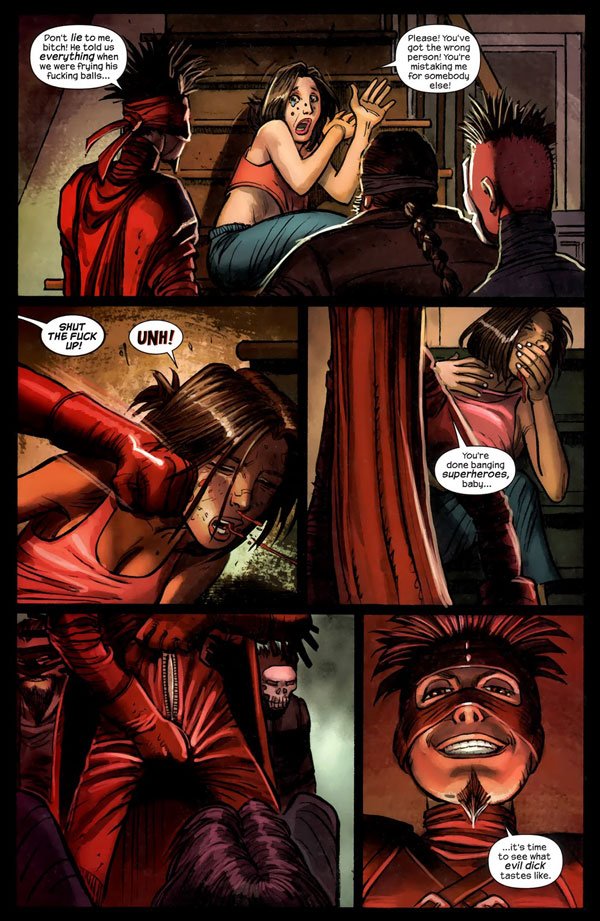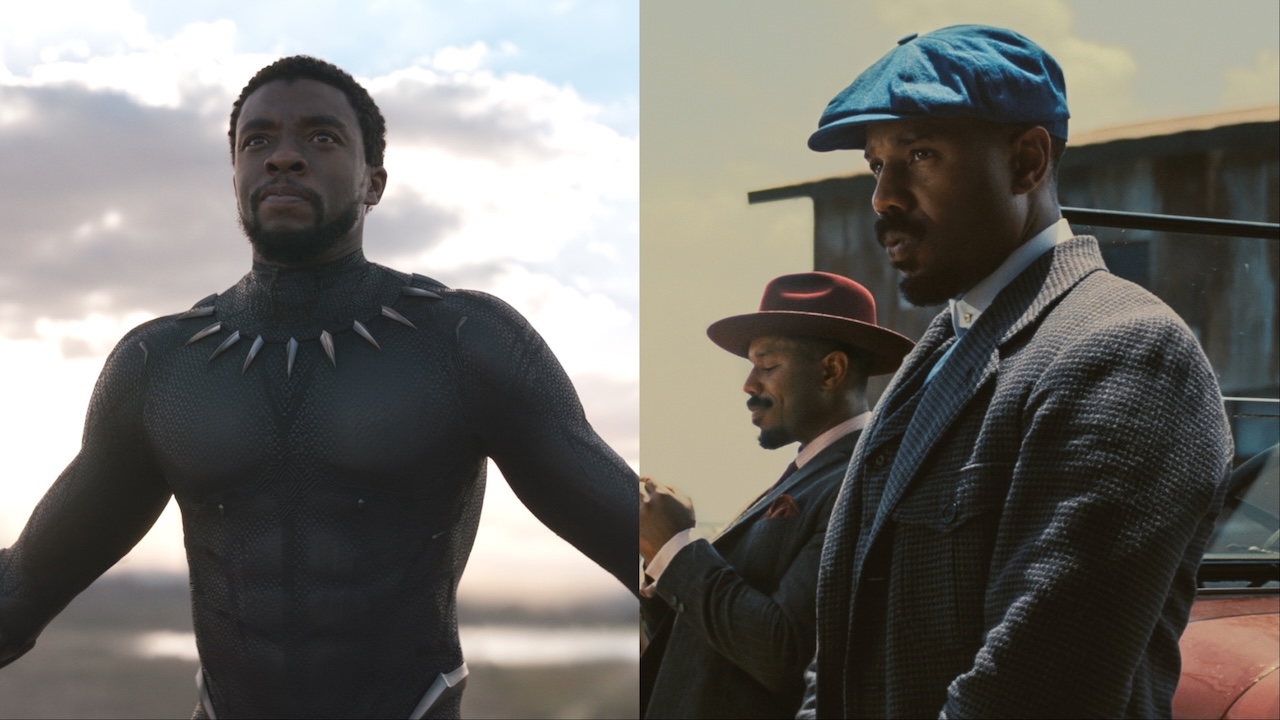Why Kick-Ass 2 Creator Mark Millar's Rape Comments Have So Many People Angry

Over the weekend you may have noticed your comic book-loving friends or self-proclaimed geek girls were grinding their teeth or publicly denouncing comic book writer Mark Millar. Having penned Spider-Man and Fantastic Four comics as well as his own like Nemesis, The Authority, Wanted, and Kick-Ass, the Scottish writer is a big name in comics, and with more and more of his books like Nemesis and Kick-Ass 2 getting adaptations—not to mention his role as a comic consultant at Fox--he’s also becoming a force in film. Though we're hearing that Kick-Ass 2 is perfectly violent and button-pushing, that's not actually the reason that Millar is under fire this week. That comes down to a single word: rape.
Millar is very fond of using rape as a plot device in his work, including Wanted, The Authority, Nemesis and Kick-Ass 2 (more on that later). He’s faced criticism for its inclusion, and when The New Republic asked him about that he responded:
“The ultimate [act] that would be the taboo, to show how bad some villain is, was to have somebody being raped, you know. I don't really think it matters. It's the same as, like, a decapitation. It's just a horrible act to show that somebody's a bad guy.”
Millar has been a controversial figure in comics for years, thanks to books that are wildly violent—even for their genre—and are often considered boundary-pushing for the level of menace within them. For instance, in Nemesis, a book that basically imagines what would happen if a billionaire opted to become a villain instead of, say, Batman, his baddie kidnaps a cop’s son and daughter, impregnates the latter with the former’s sperm and then “rigs” her womb to blow if an abortion was attempted. Millar claims his outlandish violence is meant satirically, but whether that message gets across is a matter of debate on its own. Still, his comments on rape open a whole other can of worms.
First off, as the recent firestorm over rape jokes revealed, rape as a subject matter is far from taboo. Its inclusion in popular culture is so expected that the very suggestion an artist (be they stand-up comic or comic book writer) should be mindful about how they address it brought a relentless shit storm down on feminist blogger Lindy West.
Secondly, rape and decapitation are not the same. Both are horrible acts of violence, sure. But the latter is not one that causes people to ask, “Well, what was she wearing when she got decapitated?” There’s no victim blaming inherent in decapitation, but more to the point decapitation is not a thing that people fear in their day-to-day life the way that many women fear rape. Comparing the two so blithely just reveals how out of touch Millar is with female comic book readers, who yes, do exist.
To tackle Millar’s assertion that the difference between rape and decapitation doesn't really matter, I’ll refer to Comics Alliance’s John Hughes, “In a culture in which rape is undeniably endemic, Millar’s steadfast refusal to consider the potential ramifications of his work remains astounding, infuriating, irresponsible, and sad. In the United States, where the majority of Millar’s comics are published and sold, one in six women has experienced an attempted or completed rape, only 16% of rapes and sexual assaults are reported to the police, and only about 5% of rapists will ever spend a day in jail.” While I couldn't find hard statistics about beheadings in the US, I think it's safe to say fewer than one in six people have been decapitated. Of course there’s plenty of ways to show a villain is a bad guy-- robbing banks, killing sidekicks, kidnapping love interests and dangling them over bridges. But sexual assault is employed against female characters far more often then male characters. And its use in comics, where women are wildly underrepresented, is another attack on the vagina-havers that actually like reading comics. It’s not a new problem, which makes Millar’s suggestion that rape is somehow a fresh device all the more frustrating. This problem has a name, and it’s “Women in Refrigerators.”
The phrase was coined by celebrated (and female!) comic book writer Gail Simone to describe the tired, but recurring comic trope of injuring, raping, or killing a female character solely to impact the male hero. It takes its name from a 1994 Green Lantern comic wherein the titular hero literally finds his murdered girlfriend stuffed in his refrigerator when he comes home. This device reduces women to props within the narrative, which beyond being lazy writing is especially infuriating for readers who would rather see engaging female characters than pretty victims made to be murdered.
Your Daily Blend of Entertainment News
In the comic for Kick-Ass 2, a teen girl named Katie is the title character’s crush. So, to get at Kick-Ass, his nemesis The Mother Fucker (formerly The Red Mist) decides he and his crew will gang rape the girl. You can see the panels below.

(Click for full size)
Comics Alliance editor-in-chief Laura Hudson explained her outrage over the above: “There’s one and only one reason that happens, and it’s to piss off the male character. It’s using a trauma you don’t understand in a way whose implications you can’t understand, and then talking about it as though you’re doing the same thing as having someone’s head explode. You’re not. Those two things are not equivalent, and if you don’t understand, you shouldn’t be writing rape scenes.”
Basically, Millar may like to think he’s playing the boundary-pushing bad boy by having his baddies rape at random, but in fact he’s just reflecting the ambivalence our culture already has toward this horrendous act. And he’s clearly not aware of that. Thankfully, Christopher Mintz-Plasse, who plays The Mother Fucker in Kick-Ass 2, says this scene will not be in the movie, “The rape scene is not in it. There’s a version of it but there’s no rape. Thank God.”
I’ll second his “Thank God.” I haven’t seen Kick-Ass 2 yet. But at this point I’m basically dreading it even though I adored the first movie. Millar’s ambivalent attitude toward depictions of sexual violence and his ease at relegating women to objects of jeopardy is disturbing to say the least. Seeing Kick-Ass 2 is part of my job, so I will see it. But much like those who love the book Ender’s Game but loathe author Orson Scott Card’s bigoted remarks, I’m torn on whether I personally want to support Millar’s career by buying tickets to movies based on his works. I’m conflicted. How about you?
This poll is no longer available.
Staff writer at CinemaBlend.

